Zeenat Shahzadi: Fears for missing Pakistan reporter
- Published
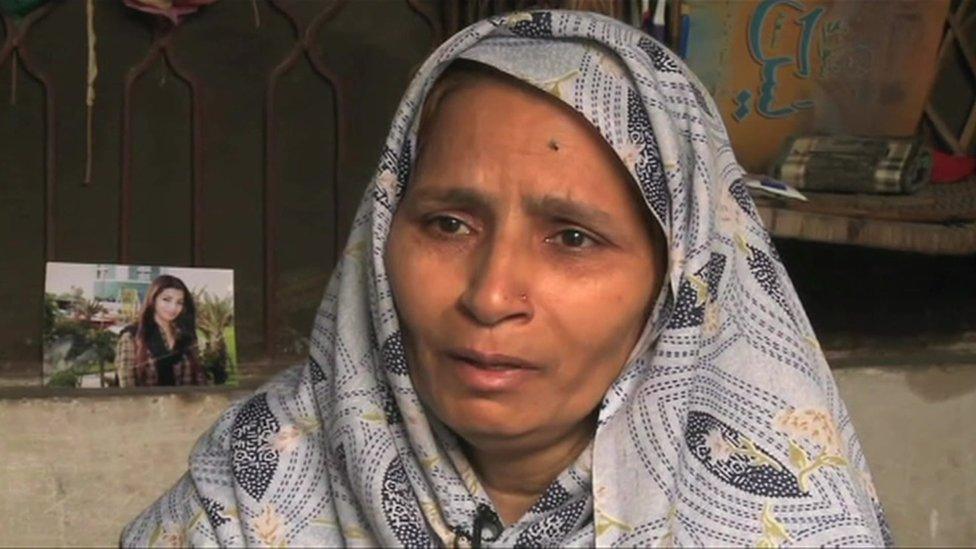
Kaneez Bibi's family has been torn apart since her daughter was abducted
Zeenat Shahzadi is believed to be the first female journalist "forcibly disappeared" in Pakistan. Her family and human rights groups say she was abducted by security agencies who have been accused of illegally detaining thousands of people under the guise of anti-terrorism operations. BBC Urdu's Saba Eitizaz investigates.
Nearly a year has passed since Zeenat Shahzadi disappeared but her room seems frozen in time.
Set against the peeling wall paint, her dressing table is gathering dust, her comb and favourite lipstick are exactly where she left them on the morning she went missing.
Her clothes are hanging in the closet and her mother, Kaneez Bibi, keeps them fresh and ironed.
"I just put away her winter clothes and took out the summer ones she will wear when she comes back," she said.
Her voice trembles, as do her hands as she wipes and cleans Zeenat's things.
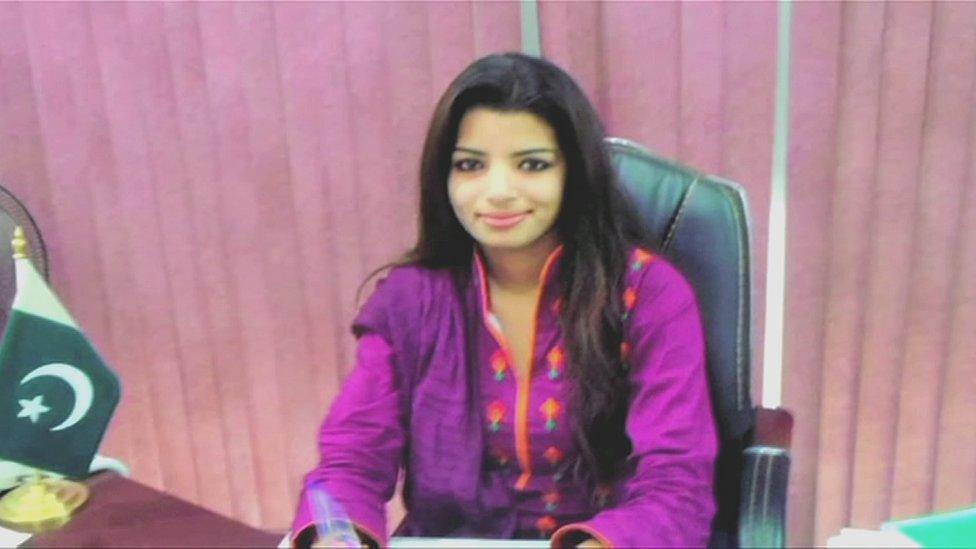
Zeenat Shahzadi was proud to work as a journalist and was the main earner for her family
Zeenat's mother refuses to give up hope but it was too much for her son, Zeenat's youngest brother.
Saddam, who was 17, took his own life in March. His family says he was Zeenat's best friend.
"He used to ask me every day when Zeenat would be coming home," said Kaneez Bibi. "On the last day he said to me, 'Mum, Zeenat is never coming back'."
Kaneez Bibi starts sobbing into her scarf.
"It's my fault. Why did I cry for Zeenat in front of him? That child just couldn't take it any more."
Indian link
Zeenat Shahzadi was a freelance reporter for local channels and also liked to call herself a human rights activist.
Despite coming from a humble background, she made a career for herself and was the only one financially supporting her family.
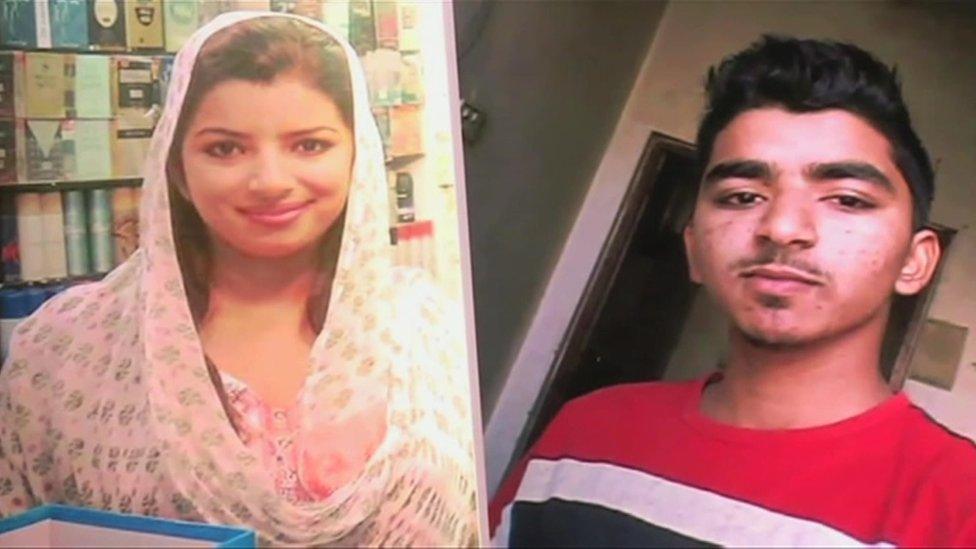
Zeenat's younger brother Saddam, seen here on the right, was unable to cope with the disappearance of his sister
Before her abduction, the 24-year-old journalist had been working on the case of Indian citizen Hamid Ansari who went missing in Pakistan in November 2012.
Through social media, she managed to get in touch with Hamid's mother in Mumbai and filed a missing person's petition in court on her behalf.
She played an important role in encouraging a government commission on enforced disappearances to investigate his case.
As a result, security agencies admitted to the commission that Hamid was in their custody.
He was later sentenced and jailed by a military court. That same year Zeenat went missing.
Human rights lawyer Hina Jillani says Zeenat's disappearance did not come out of nowhere.
"Zeenat's family told us that Zeenat was forcefully picked up by security officials before [her disappearance] and detained for four hours," said Hina Jillani.
"She told her family that they interrogated her about Hamid Ansari."
Snatched on the street
On 19 August 2015, Zeenat Shahzadi took a rickshaw to work but never got there.
Two cars blocked her on the road; armed men got out and abducted her.
She was due to appear before the Commission on Enforced Disappearances to give testimony on the Hamid Ansari case in the next few days.
Human rights organisations are worried that her abduction represents a dangerous trend.
She is the first female journalist to be "disappeared" and it happened in broad daylight in the busy city of Lahore, not some remote rural road.
"We are convinced that this is the work of the secret government agencies, because when someone is detained by them, the police can be quite helpless, and we have seen that in this case," said Hina Jillani.
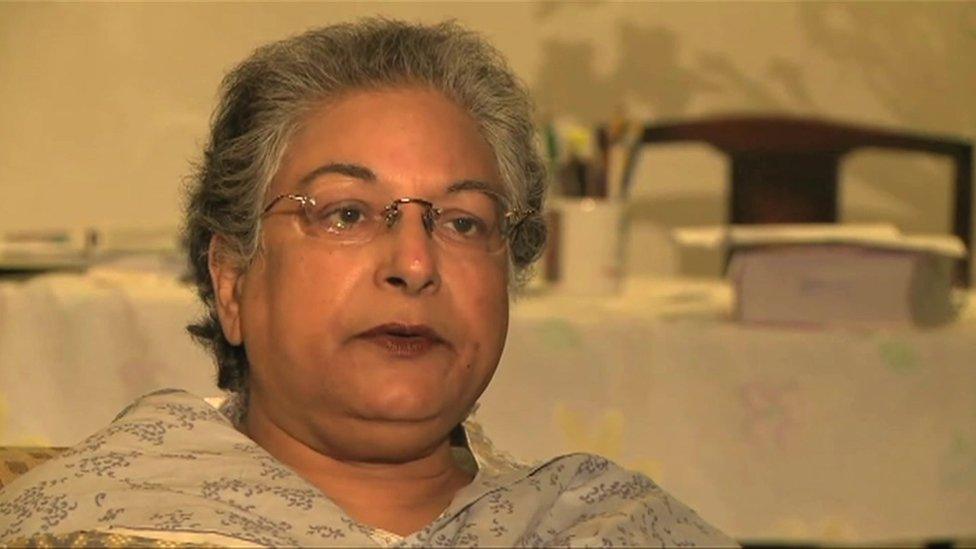
Human rights laywer Hina Jillani says eyewitness descriptions of how Zeenat was abducted point towards the actions of security agencies
The government sponsored Commission on Enforced Disappearances has been investigating Zeenat Shahzadi's case.
A senior official, who would only talk off the record, said efforts were being made to "recover" her and expressed hope that there would be progress on her case soon.
This senior official also said security agencies had denied any link to her disappearance.
Above the law?
Although the government set up a special commission to try to locate the increasing numbers of missing people in Pakistan, human rights activists say the country's security agencies are not accountable to anyone.
According to government records, 1,300 out of a total of 3,000 cases are still pending unresolved before the commission.
Human rights activists are concerned that the new counter terrorism laws brought in to deal with the country's volatile security situation have a major drawback - they give security agencies ample leeway to illegally arrest people without a warrant or explanation. They can just disappear.
"When you are making new laws that run parallel to the existing legal system, then you are allowing certain individuals and institutions to operate without accountability and with impunity," said Hina Jillani.
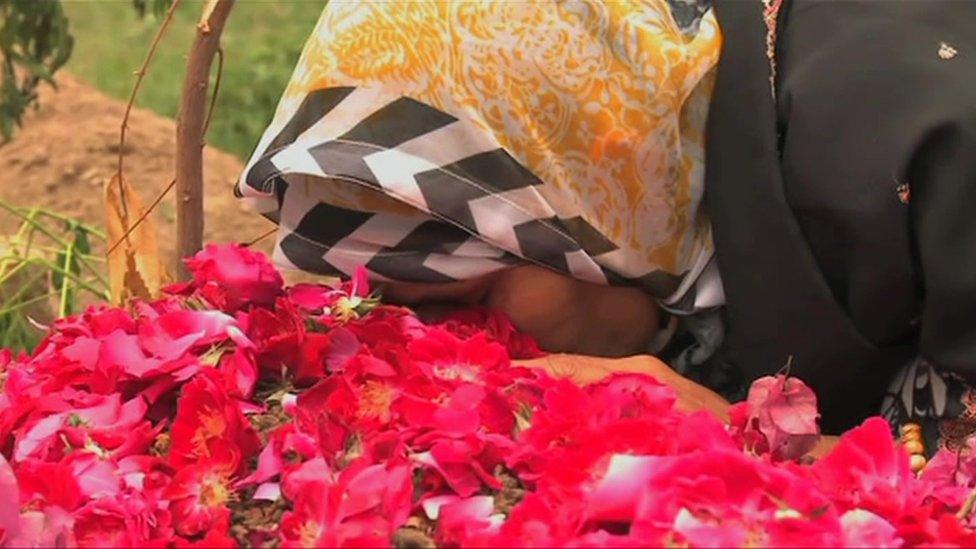
Kaneez Bibi pays her respects at her son's grave but is at a loss as to the fate of her daughter
But it is the families of the disappeared who may be paying the highest price.
Zeenat's mother takes some comfort from visiting her son's grave. She brings flowers and prays. She sits among the tombstones for hours.
But Kaneez Bibi is deprived that sense of closure for her daughter.
"Can someone just tell me whether my daughter is alive or dead? I don't even know whether to wait for her return or pray for her soul."